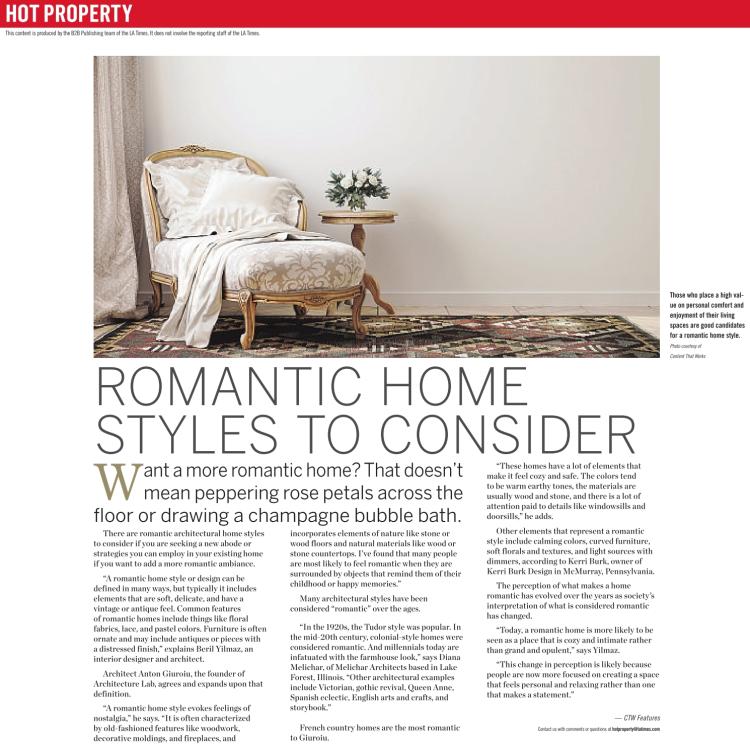

This content is produced by the B2B Publishing team of the LA Times. It does not involve the reporting staff of the LA Times.
There are romantic architectural home styles to consider if you are seeking a new abode or strategies you can employ in your existing home if you want to add a more romantic ambiance.
“A romantic home style or design can be defined in many ways, but typically it includes elements that are soft, delicate, and have a vintage or antique feel. Common features of romantic homes include things like floral fabrics, lace, and pastel colors. Furniture is often ornate and may include antiques or pieces with a distressed finish,” explains Beril Yilmaz, an interior designer and architect.
Architect Anton Giuroiu, the founder of Architecture Lab, agrees and expands upon that definition.
“A romantic home style evokes feelings of nostalgia,” he says. “It is often characterized by old-fashioned features like woodwork, decorative moldings, and fireplaces, and incorporates elements of nature like stone or wood floors and natural materials like wood or stone countertops. I’ve found that many people are most likely to feel romantic when they are surrounded by objects that remind them of their childhood or happy memories.”
Many architectural styles have been considered “romantic” over the ages.
“In the 1920s, the Tudor style was popular. In the mid-20th century, colonial-style homes were considered romantic. And millennials today are infatuated with the farmhouse look,” says Diana Melichar, of Melichar Architects based in Lake Forest, Illinois. “Other architectural examples include Victorian, gothic revival, Queen Anne, Spanish eclectic, English arts and crafts, and storybook.”
French country homes are the most romantic to Giuroiu.
“These homes have a lot of elements that make it feel cozy and safe. The colors tend to be warm earthy tones, the materials are usually wood and stone, and there is a lot of attention paid to details like windowsills and doorsills,” he adds.
Other elements that represent a romantic style include calming colors, curved furniture, soft florals and textures, and light sources with dimmers, according to Kerri Burk, owner of Kerri Burk Design in McMurray, Pennsylvania.
The perception of what makes a home romantic has evolved over the years as society’s interpretation of what is considered romantic has changed.
“Today, a romantic home is more likely to be seen as a place that is cozy and intimate rather than grand and opulent,” says Yilmaz.
“This change in perception is likely because people are now more focused on creating a space that feels personal and relaxing rather than one that makes a statement.”
— CTW Features
Contact us with comments or questions at hotproperty@latimes.com
Those who place a high value on personal comfort and enjoyment of their living spaces are good candidates for a romantic home style.
Photo courtesy of
Content That Works